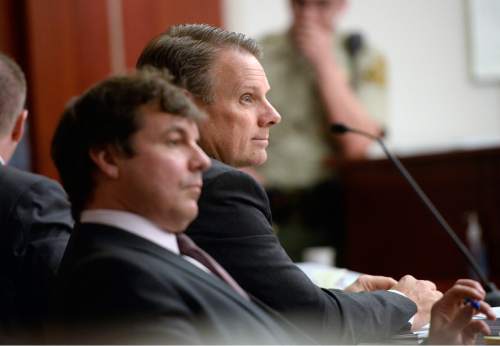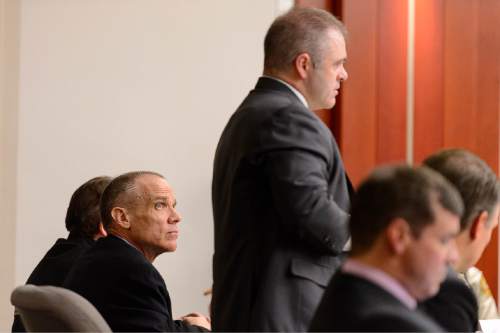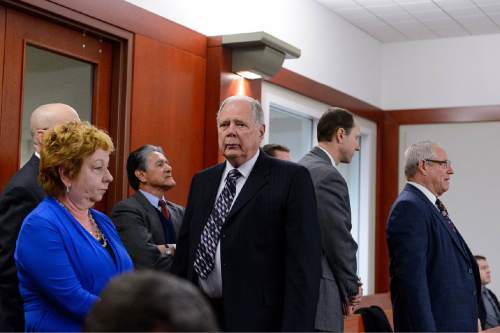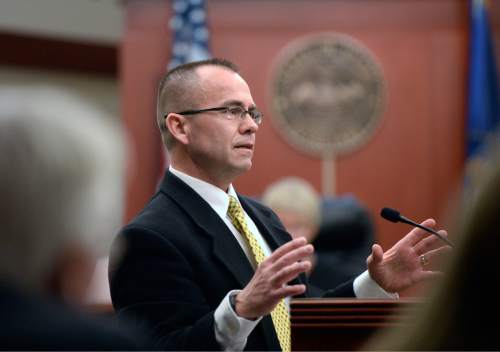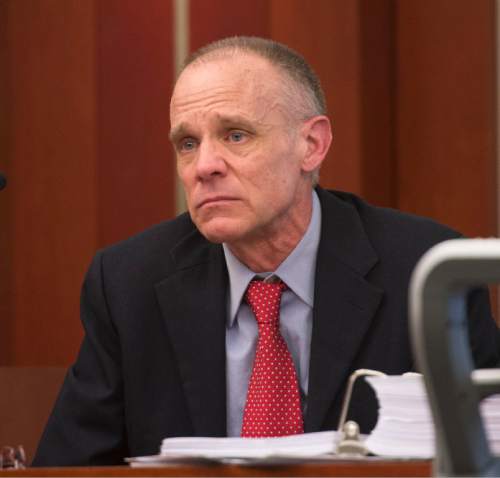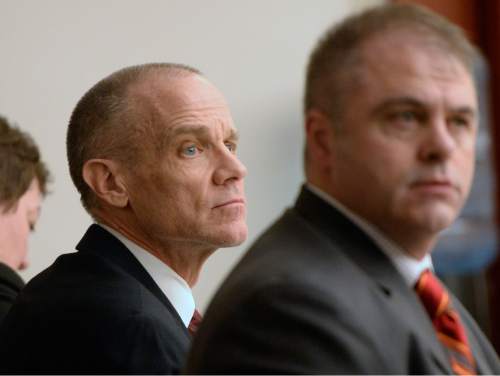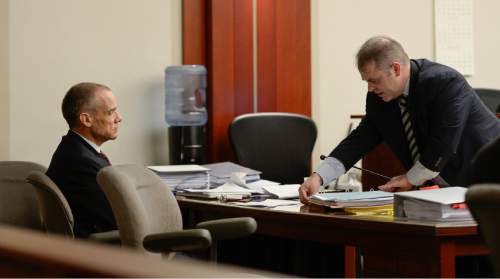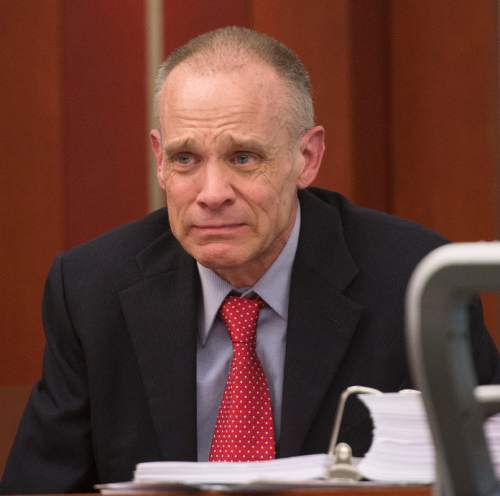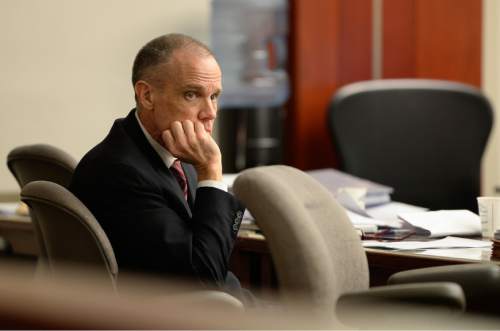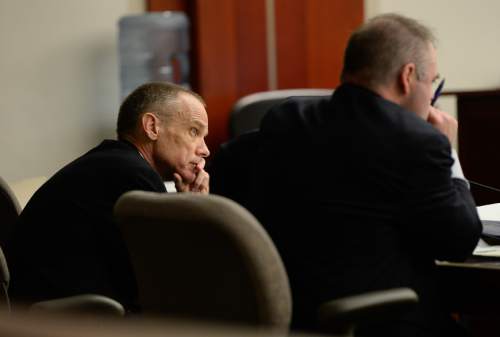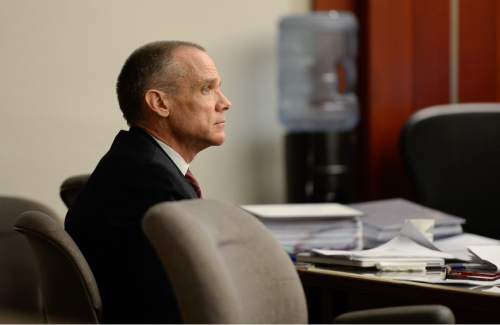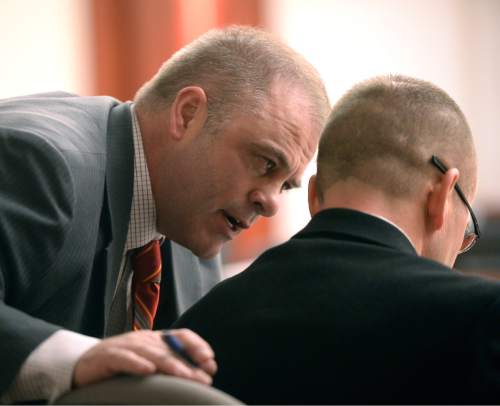This is an archived article that was published on sltrib.com in 2015, and information in the article may be outdated. It is provided only for personal research purposes and may not be reprinted.
On the witness stand Wednesday, accused fraudster Marc Sessions Jenson told a jury that he always disclosed his past criminal and financial problems to potential investors and never said the planned Mount Holly resort was free of any debt.
"I never once made that comment," Jenson said in 3rd District Court, noting that real estate data is readily available publicly on Internet sites. "Real estate is the most transparent business there is … It would be foolhardy and foolish and it would be instantly found out."
Late Wednesday, the defense rested its case. Closing arguments in the trial, in its third week, are expected Thursday morning.
Jenson was on the stand for a third day Wednesday, answering questions from prosecutor Tim Taylor, the chief deputy Utah County attorney.
Jenson, 54, has pleaded not guilty to eight counts of fraud, money laundering and theft by deception, in connection with the failed Mount Holly golf and ski resort near Beaver. If he is convicted of the charges, Jenson faces a prison term of up to 15 years on each count.
Jenson was charged in 2011, when former Utah Attorney General Mark Shurtleff was still in office.
Jenson, who was prosecuted by the state in 2008 for securities fraud, in 2013 became a key player in the bribery and corruption investigation of Shurtleff and his former chief deputy John Swallow when Jenson alleged the pair had pressured him for money and favors.
Defense attorney Marcus Mumford contends Jenson's current prosecution is part of a political punishment for refusing to comply with a "shakedown" orchestrated against him by the former Utah top cops.
Jenson is currently incarcerated for failing to pay some $4.1 million in restitution that was part of his 2008 plea in abeyance.
Jenson's history with the former attorneys general has been woven throughout the trial testimony, although Taylor has sought to bar some details of those relationships, citing irrelevance. That includes blocking an explanation of the details surrounding a $2 million restitution payment Jenson said Wednesday that he was asked to pay to two businessmen in 2009 by Shurtleff and Swallow in relation to his 2008 plea.
Under questioning by both Taylor and Mumford, Jenson said he had in fact paid close to $2 million in restitution directly to businessmen Morris Ebeling and Mark Robbins — not the courts — as he was instructed to do by Shurtleff, Swallow and Scott Reed, who handled the case for the Utah attorney general's office. Financial documents offered by Mumford appeared to document those claims.
"I was told early on by Scott Reed, by Shurtleff and Swallow in person, that I was doing what I should be doing," Jenson said.
He said he had intended to explain the arrangement to a judge during his sentencing, but was advised to let his attorney handle the matter. The attorney, however, told the court he had directed Jenson not to make restitution and pay, and asked the court to grant the businessman more time, Jenson said.
"I tried to get up [to explain]," Jenson said, color flooding his face as he broke into a sob and dropped his head into his hands. "But it was too late … they sent me to prison."
On the stand Wednesday, Reed said he did not recall ever "directing" Jenson to pay the restitution directly. However, Reed said that in the midst of plea negotiations he became more concerned that the payments were made and "less concerned as to how it got to the victims."
Three alleged victims in the Mount Holly case — who claim combined losses of more than $2.3 million — have testified that they were assured the multi-billion-dollar Mount Holly development was free of any debt and was a no-risk investment.
Prosecutors contend Jenson failed to disclose required information to investors, including that they were near bankruptcy, had been sued over the project and had past criminal convictions.
Mumford contends the resort — which sought to transform the former Elk Meadows ski area with luxury homes, private ski facilities and a Jack Nicklaus-designed golf course — failed because its key financial backer failed to come through with funding.
On the stand, investors also said that prior to investing in Mount Holly, they did not know Jenson had been convicted of fraud and tax evasion in the 1990s, had pleaded no contest to securities fraud in 2008, owed millions in restitution or had past bankruptcies.
Jenson denied those claims Wednesday and said disclosing his past was a condition of his participation in sales of Mount Holly memberships that was placed on him by his financial partners, including New York hedge fund XE Capital and the Nicklaus organization. It was also the reason that Jenson said he was not a Mount Holly officer, or principal, but a contract marketing consultant.
The issue was raised initially with the three victims through Mount Holly associate Tim Bell, who recruited the men to the project, and was followed up in personal conversations, Jenson said. The disclosure included pointing interested parties to a January 2007 Salt Lake Tribune article that outlined Jenson's "litigious life."
Jenson said he told investors: "Just Google me."


